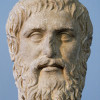“ The movement of a body of men can never have the pliancy or facility of a single man; the freedom of the individual, which is always limited, becomes still more straitened when transferred to a nation. ”
Plato, The Republic. copy citation
| Author | Plato |
|---|---|
| Source | The Republic |
| Topic | freedom body |
| Date | |
| Language | English |
| Reference | |
| Note | Translated by Benjamin Jowett |
| Weblink | http://www.gutenberg.org/files/1497/1497-h/1497-h.htm |
Context
“He does not see that the analogy is partly fallacious, and that the will or character of a state or nation is really the balance or rather the surplus of individual wills, which are limited by the condition of having to act in common. The movement of a body of men can never have the pliancy or facility of a single man; the freedom of the individual, which is always limited, becomes still more straitened when transferred to a nation. The powers of action and feeling are necessarily weaker and more balanced when they are diffused through a community; whence arises the often discussed question, 'Can a nation, like an individual, have a conscience?' We hesitate to say that the characters of nations are nothing more than the sum of the characters of the individuals who compose them;”
source


